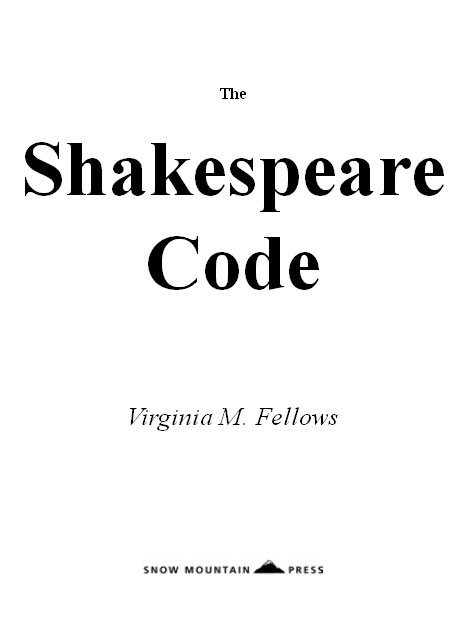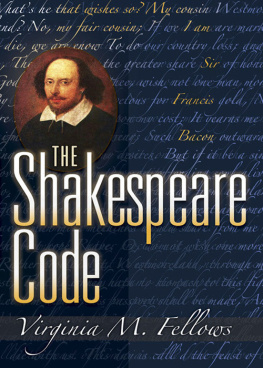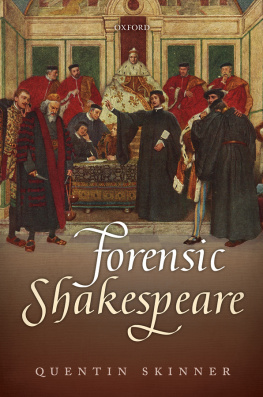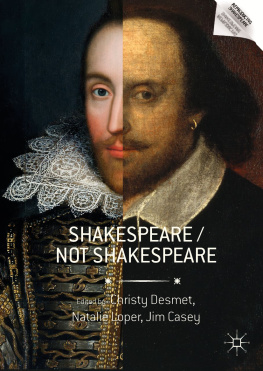Virginia M. Fellows - The Shakespeare Code
Here you can read online Virginia M. Fellows - The Shakespeare Code full text of the book (entire story) in english for free. Download pdf and epub, get meaning, cover and reviews about this ebook. year: 2006, publisher: Summit University Press, genre: Detective and thriller. Description of the work, (preface) as well as reviews are available. Best literature library LitArk.com created for fans of good reading and offers a wide selection of genres:
Romance novel
Science fiction
Adventure
Detective
Science
History
Home and family
Prose
Art
Politics
Computer
Non-fiction
Religion
Business
Children
Humor
Choose a favorite category and find really read worthwhile books. Enjoy immersion in the world of imagination, feel the emotions of the characters or learn something new for yourself, make an fascinating discovery.
- Book:The Shakespeare Code
- Author:
- Publisher:Summit University Press
- Genre:
- Year:2006
- Rating:5 / 5
- Favourites:Add to favourites
- Your mark:
- 100
- 1
- 2
- 3
- 4
- 5
The Shakespeare Code: summary, description and annotation
We offer to read an annotation, description, summary or preface (depends on what the author of the book "The Shakespeare Code" wrote himself). If you haven't found the necessary information about the book — write in the comments, we will try to find it.
The Shakespeare Code — read online for free the complete book (whole text) full work
Below is the text of the book, divided by pages. System saving the place of the last page read, allows you to conveniently read the book "The Shakespeare Code" online for free, without having to search again every time where you left off. Put a bookmark, and you can go to the page where you finished reading at any time.
Font size:
Interval:
Bookmark:

THE SHAKESPEARE CODE
by Virginia M. Fellows
Copyright 2006 Summit Publications, Inc.
All rights reserved
Originally published 2000
First Snow Mountain Press edition, revised and expanded, 2006
No part of this book may be reproduced, translated, or electronically stored, posted or transmitted, or used in any format or medium whatsoever without prior written permission, except by a reviewer who may quote brief passages in a review. For information, contact Summit University Press, 63 Summit Way, Gardiner, MT 59030-9314.
Tel: 1-800-245-5445 or 406-848-9500
Web site: www.SummitUniversityPress.com
Library of Congress Control Number: 2006921901
ISBN: 978-1-932890-02-0 (paperback)
ISBN: 978-1-932890-51-8 (eBook)

Snow Mountain Press is an imprint of Summit University Press.
Cover portrait: the Chandos painting, widely believed to be of William Shakespeare (National Portrait Gallery, London)
Some images copyright 2006 Jupiterimages Corporation
I dedicate this book to my wonderful family and all the patient ones whose help made it possible to bring it to a finish.
I thank each one of you from the bottom of my heart.
I want to thank the dedicated members of the Francis Bacon Society of London for your many years of tireless probing into every possible aspect of the Shakespeare-Bacon anatomy. I owe much to your thorough scholarship.
* * *
The editors would like to especially thank Lawrence Gerald, Simon Miles and all who graciously offered their feedback and comments.
I am seeking not my own honour, but the honour and advancement, the dignity and enduring good of all mankind.
I keep the future ever in my plan, looking for my reward, not to my times or countrymen, but to a people very far off, and an age not like our own, but a second golden age of learning.
Francis Bacon
In November 1623, the First Folio of the plays of William Shakespeare was published. The Folio is one of the most closely studied works of English literature, yet it raises many unanswered questions. In October 1623, a month earlier, Francis Bacon, one of the leading figures of the English Renaissance, published a book containing a complete description of a new and ingenious system of concealing messages in code. Is it just a coincidence that these two books were published one month apart?
In fact, the code that Bacon described unlocks many of the mysteries of the First Folio. The key to the Shakespeare code was embedded in a book that was widely circulated in his time and to the present. Yet it was more than 250 years before anyone realized that Bacons writings on ciphers were not just theoretical, but they were describing his method for recording a secret history of his times.
Francis Bacon used this and other codes to conceal his work in books published under his own name and under the names of Shakespeare, Spenser, Marlowe and others of the time. The hidden messages tell a startling story. They reveal state secrets and scandalsthe marriage of a Virgin Queen, murder and intrigue, corruption and lies at the highest levels of the government. And they also tell the personal life story of Francis Bacon himself.
These stories could not be safely told in Bacons own daymore than one person was severely punished for daring to speak these truths. So Bacon concealed them in code, hoping for a future time when they could be discovered and a day when men could be free to speak and to know the truth. The codes and the secrets they contain were discovered in the late 1800s. We believe it is time for the truth to be known and the story of the cipher to reach a wider audience.
This book is an account not so much of the intricacies of ciphers and the detective work of those who discovered them, but of the hidden story itself. It does fill in details of history but, more importantly, it sets the record straight about Francis Bacon, one of the most remarkable men the world has seen.
Bacon lived in an era filled with great men and women whose names are known even today: Walter Raleigh, Francis Drake, Ben Johnson, Leicester, Essex, Queen Elizabeth I. His name may not be as well known in our time as some of the others in this list, but he has been the most influential of them all, and we are all the beneficiaries of his work.
In the idealism of his youth, he envisioned a grand plan to change the world. He sought to free the mind of man from the straitjacket of religious and secular orthodoxy. He rejected the science of his day as lacking in practical accomplishment. He foresaw a time when science and industry would lift the curse of Eden. And he outlined a new philosophy of science and nature to achieve that goal. All this is recorded in history books.
The startling story hidden in code reveals still more. It tells of Francis Bacon as the true author of the plays and poems attributed to Shakespeare. The plays are among the greatest works of English literature. They have illuminated the issues of love and life, of right and wrong, of loyalty and friendship, of mercy and justice. Even more than this, Bacon sought to create a new language and literature in England, one that could be used to express the most sublime concepts of morality and philosophy, so that great ideas and ideals could be accessible to all, not just to those who could speak and read Latin.
The codes also reveal a hidden side of Francis Bacon and the struggles he faced. They tell of a destiny denied, secrets that could not be told. They tell of tragedy and loss, a great persecution by those who saw themselves as his enemies. Yet even in the midst of all this, Bacons spirit remained undaunted, his optimism undimmed. Against great odds, he forged a victory from the midst of seeming defeat.
The codes and their revelations are not the end of the story of Francis Bacon, but only a beginning. They are one way of entry into his fascinating life and achievements, but not the only one. This book combines their revelations with the outer story to give a picture of Francis Bacon that has not been told before.
The author, Virginia Fellows, worked for many years to bring it to fruition. We are pleased to be able to present the story in this latest edition, which has been significantly revised throughout. New for this edition are most of the illustrations, captions and notes. We have also added a section which includes an account of the codes and details of their workings.
Virginia was gratified to see the beginning of the work on the new edition in 2005. Unfortunately, she did not live to see it finished. Shortly before she died, we were able to show her the new cover and she was grateful to know that an important part of what she considered to be her own mission would finally be fulfilled.
As you read this book, we hope that you will come to know something of the soul of Francis Bacon as Virginia knew him and as we have come to know him. There are lessons here for all of us.
Bacon was a visionary and a poet, yet someone who walked the corridors of power and held the highest offices in the land. Eventually, the rich and powerful cast him out; he was a scapegoat who might be sacrificed so that they could live another day in their own corruption. He did not become resentful or bitter. Rather, he set himself again to fulfill the aspirations of his youth, and perhaps his greatest contributions were after his retirement from public life.
Font size:
Interval:
Bookmark:
Similar books «The Shakespeare Code»
Look at similar books to The Shakespeare Code. We have selected literature similar in name and meaning in the hope of providing readers with more options to find new, interesting, not yet read works.
Discussion, reviews of the book The Shakespeare Code and just readers' own opinions. Leave your comments, write what you think about the work, its meaning or the main characters. Specify what exactly you liked and what you didn't like, and why you think so.









